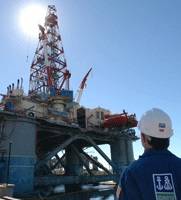

DNV has restructured its offshore classification rules for Mobile Offshore Units in order to improve transparency and enhance safety.
“Our aim is to help the rig owner in the building process – to clearly show that the unit is constructed in compliance with reliability and safety standards. At the same time, yards can achieve improved efficiency and have the ability to document the safety level of alternative solutions,” said Erik Henriksen, Director for Mobile Offshore Units at DNV.
International offshore regulations and requirements are constantly adapting to new conditions, technologies and safety issues. Class rules prescribe how the regulations are to be met and help the owner and yard in designing and constructing the newbuild. But achieving an optimal result requires a delicate balance between detailed prescriptive vs. functional and more general requirements. The first ensure predictable and transparent results, while the latter allow the application of alternative solutions.
“Today, DNV is launching an enhanced and restructured version of our offshore classification rules for Mobile Offshore Units. I’m confident that these will provide stakeholders with a clear description of the technical requirements. As before, the rules are aligned with the IMO MODU Code, International Association of Classification Societies (IACS) Unified Requirements and other relevant international standards and codes. However, in addition, they include a comprehensive description of interpretations. This makes the rules’ requirements easily understandable for application throughout the design, construction and operation of the asset,” Henriksen pointed out.
The enhanced and restructured format is now open for comments during an external six-week consultation period. Subsequently, DNV will update the standards based on the input received, followed by formal publication.
www.dnv.com



